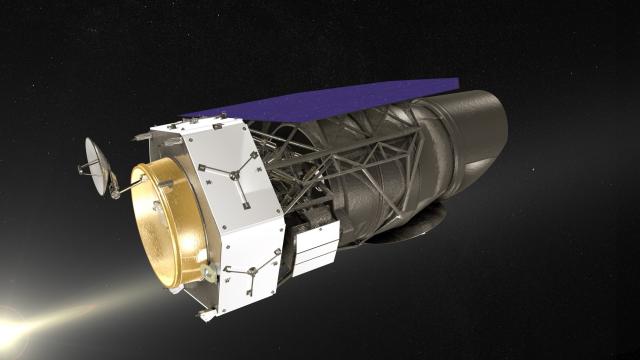US President Donald Trump’s 2019 budget request would nix the Wide Field Infrared Survey Telescope (WFIRST), and scientists aren’t happy.
Rendering of the Wide Field Infrared Survey Telescope Image: NASA
The WFIRST telescope’s goals would include mapping the universe to better understand dark matter and dark energy, and even image exoplanets. The mission was one of the top priorities of the National Research Council’s 2010 decadal survey on astronomy and astrophysics. The president cuts the telescope and other programs as part of a refocusing towards space exploration, NASA CFO Andrew Hunter said in a press call. Many astronomers I spoke with felt cutting the project would have consequences on America’s role in astronomy.
“The science it plans to do is transformative,” Alistair Walker, Dark Energy Camera Instrument Scientist, told Gizmodo. “So I think it for us it would be a big setback if it were not funded. It was the highest priority and was likely to be the highest priority in the next decadal survey.”
WFIRST would have a mirror the same size as the Hubble’s, but a field of view around 100 times greater, according to a NASA webpage. That means it would be especially good at making large, detailed images for population studies, researching a lot of planets, stars and galaxies at the same time. One of its two instruments was meant to directly image exoplanets.
The telescope was already facing budgetary problems, Nature reported earlier this year, as its projected cost swelled from $US1.6 billion ($2 billion) to $US3.2 billion ($4.1 billion). But astrophysicist Katie Mack told me that much of the telescope’s science case hinged on a large mirror given to the NASA scientists by the US government (more specifically, the National Reconnaissance Office, the spy satellite builders).
The budget document says that the US government will continue to fund the James Webb Space Telescope slated for a 2019 launch. “This is a cost-size issue in terms of its significant cost of a flagship mission and the need to fund higher-priority missions,” said Hunter. “We will have lower-cost astrophysics funding with remaining dollars.”
But WFIRST is in a way a complement and successor to the James Webb Space Telescope. Stacy McGaugh, astronomer from Case Western Reserve University, told me he felt that cutting it now would harm the US decades down the line, and allow other countries to surpass it in observational capabilities. “These space missions take decade to develop from conception to launch. If you say you’re giving up, you’re not going to get back in that race.”
Mack worried about the overall impact to the field of astronomy as a whole. She told me:
It’s a mission that we’ve been counting on for years, because it will help us to better understand dark matter and dark energy, and will help us learn about planets around other stars – some of the things we identified as the most important questions. To suddenly cut WFIRST’s budget to zero would not just disappoint us, but totally negate years and years of planning, and retroactively waste a massive amount of time (and, obviously, taxpayer money). If NASA is going to be investing in science, it should at least be taking into account what scientists deem as the Most Important Questions.
The New York Times reports that “Presidential budgets are little more than vision statements even under normal circumstances, given that Congress controls the federal purse strings and may disregard the wishes of whomever is sitting in the Oval Office”.
Still, this budget signals that the president’s ideals include cutting US funding for the International Space Station by 2025, nixing WFIRST, and redirecting NASA education funding. Positioning the US as a leader in space, it would then seem, is not a priority.
McGaugh said: “What we’re really losing is a sense of national leadership in space exploration.”
